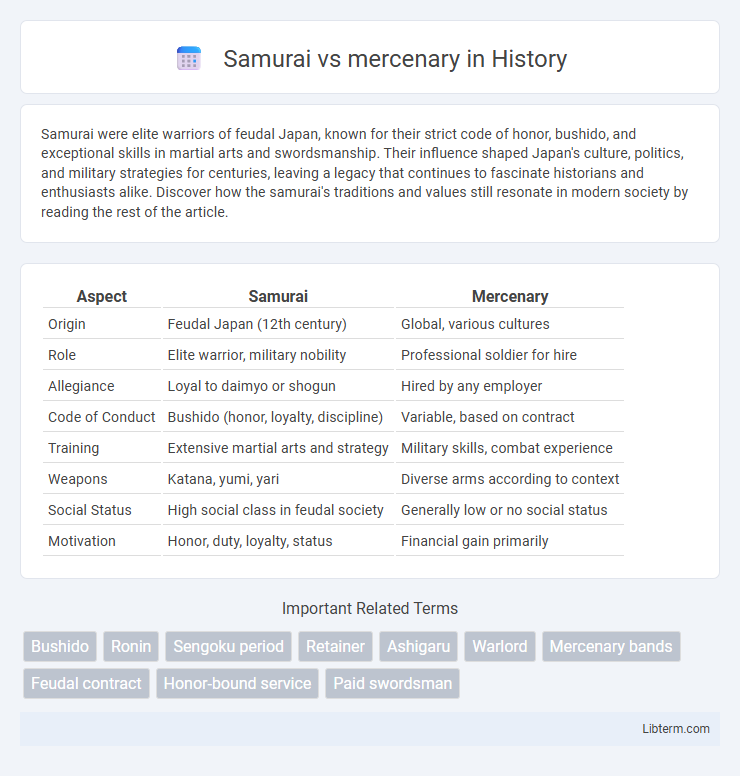Samurai were elite warriors of feudal Japan, known for their strict code of honor, bushido, and exceptional skills in martial arts and swordsmanship. Their influence shaped Japan's culture, politics, and military strategies for centuries, leaving a legacy that continues to fascinate historians and enthusiasts alike. Discover how the samurai's traditions and values still resonate in modern society by reading the rest of the article.
Table of Comparison
| Aspect | Samurai | Mercenary |
|---|---|---|
| Origin | Feudal Japan (12th century) | Global, various cultures |
| Role | Elite warrior, military nobility | Professional soldier for hire |
| Allegiance | Loyal to daimyo or shogun | Hired by any employer |
| Code of Conduct | Bushido (honor, loyalty, discipline) | Variable, based on contract |
| Training | Extensive martial arts and strategy | Military skills, combat experience |
| Weapons | Katana, yumi, yari | Diverse arms according to context |
| Social Status | High social class in feudal society | Generally low or no social status |
| Motivation | Honor, duty, loyalty, status | Financial gain primarily |
Origins and Historical Context
Samurai emerged in 12th-century Japan as a warrior class deeply rooted in bushido, emphasizing honor, loyalty, and martial skill within a feudal society. Mercenaries, originating in ancient civilizations including Greek and Roman times, were professional soldiers hired for monetary gain rather than allegiance, often fighting in varied cultural and political conflicts worldwide. The samurai's role was intertwined with Japanese aristocracy and military governance, contrasting with mercenaries who operated across diverse regions and periods, reflecting differing social structures and motivations.
Core Philosophies and Values
Samurai adhered to Bushido, emphasizing honor, loyalty, and self-discipline as central principles guiding their actions and decisions. Mercenaries prioritized pragmatism and profit, often valuing contractual obligations over personal or ethical codes. The core difference lies in the samurai's pursuit of virtue and social duty versus the mercenary's focus on financial gain and adaptability.
Recruitment and Social Status
Samurai recruitment was based on hereditary lineage and rigorous training within a strict feudal hierarchy, emphasizing loyalty and honor as core social values. Mercenaries were often recruited from diverse backgrounds, motivated primarily by financial gain rather than social status or allegiance. Samurai held prestigious social standing as part of the ruling warrior class, while mercenaries occupied a more ambiguous and lower status, viewed as professional soldiers for hire without ties to a specific social order.
Training and Weaponry
Samurai underwent rigorous training in bushido, mastering traditional weapons such as the katana, yumi (longbow), and yari (spear), emphasizing discipline, precision, and martial arts like kenjutsu and kyudo. Mercenaries, often skilled in various combat styles, trained pragmatically with a wide range of weapons depending on the region and era, including swords, crossbows, and early firearms, focusing on adaptability and survival rather than strict codes. Samurai weaponry was crafted with exceptional quality and artistry, symbolizing status, while mercenary arms were typically utilitarian, designed for effectiveness and mass production.
Roles on the Battlefield
Samurai served as highly disciplined warrior-nobles, expertly skilled in swordsmanship, archery, and horseback riding, often leading troops with a strict code of honor known as Bushido. Mercenaries operated primarily as hired soldiers, valued for their tactical flexibility and proficiency in a variety of combat roles without adherence to a specific moral code. On the battlefield, samurai emphasized strategic command and personal valor, while mercenaries adapted quickly to different warfare styles, enhancing overall military effectiveness.
Code of Conduct: Bushido vs. Contracts
Samurai adhered strictly to Bushido, a code emphasizing honor, loyalty, and self-discipline, guiding their actions beyond mere obedience. Mercenaries operate under contractual agreements focused on payment and terms, prioritizing flexibility and profit over personal honor. The Bushido code instills a moral framework transcending contractual obligations, contrasting with the pragmatic, transactional nature of mercenary service.
Loyalty and Allegiance
Samurai upheld unwavering loyalty to their daimyo and clan, embodying bushido principles that prioritized honor and lifelong allegiance, often sacrificing personal gain for their lord's cause. Mercenaries operated with flexible allegiance, offering combat skills to the highest bidder without intrinsic ties, driven primarily by financial incentives rather than ethical commitment. This fundamental difference in loyalty shaped contrasting battlefield behaviors, with samurai emphasizing duty-bound service and mercenaries prioritizing transactional engagements.
Impact on Society and Culture
Samurai shaped Japanese society by reinforcing a strict code of honor, loyalty, and discipline, deeply influencing cultural values and traditions such as bushido and martial arts. Mercenaries, hired for profit rather than loyalty, affected societies by introducing more flexible, often ruthless military tactics that altered power dynamics and economic structures across medieval Europe and beyond. The contrasting roles of samurai and mercenaries highlight differing societal priorities: honor and hierarchy versus pragmatism and mobility, which left lasting imprints on cultural identities and social organization.
Decline and Transformation
The decline of samurai power in Japan during the late 19th century came with the Meiji Restoration, which abolished the feudal system and eroded samurai privileges, leading many samurai to transform into bureaucrats, educators, or businessmen. In contrast, mercenaries evolved by adapting to global military demands, offering specialized combat skills to various states and private entities, marking a permanent shift from traditional warrior codes to pragmatic, contractual warfare. This transformation reflected broader socio-political changes, with samurai ideals becoming ceremonial while mercenary roles expanded in response to modern warfare and state formation.
Legacy in Popular Culture
Samurai embody a rich legacy of honor, discipline, and bushido that continues to influence films, literature, and video games globally, symbolizing nobility and warrior ethos. Mercenaries, often depicted as pragmatic and morally ambiguous soldiers of fortune, have carved a popular culture niche emphasizing survival, strategy, and merciless efficiency. Both archetypes shape contemporary narratives about warfare, loyalty, and identity, reflecting contrasting values and cultural ideals in entertainment.
Samurai Infographic

 libterm.com
libterm.com